A Detailed Analysis of Management Roles and Organizational Success
VerifiedAdded on 2022/11/24
|11
|2151
|152
Report
AI Summary
This report provides a comprehensive analysis of the critical role of management in organizational functioning. It explores how managers are essential for motivating employees and improving overall productivity. The report examines the development of strategies and objectives, employee development through training, and the importance of communicating a clear vision. It also delves into the creation and maintenance of organizational structure and a detailed examination of Mintzberg’s managerial roles (interpersonal, informational, and decisional). The report highlights the impact of management on employee morale and the achievement of organizational goals, using examples from companies like Amazon and Google. The conclusion emphasizes the importance of management in fostering employee engagement and gaining a competitive advantage.
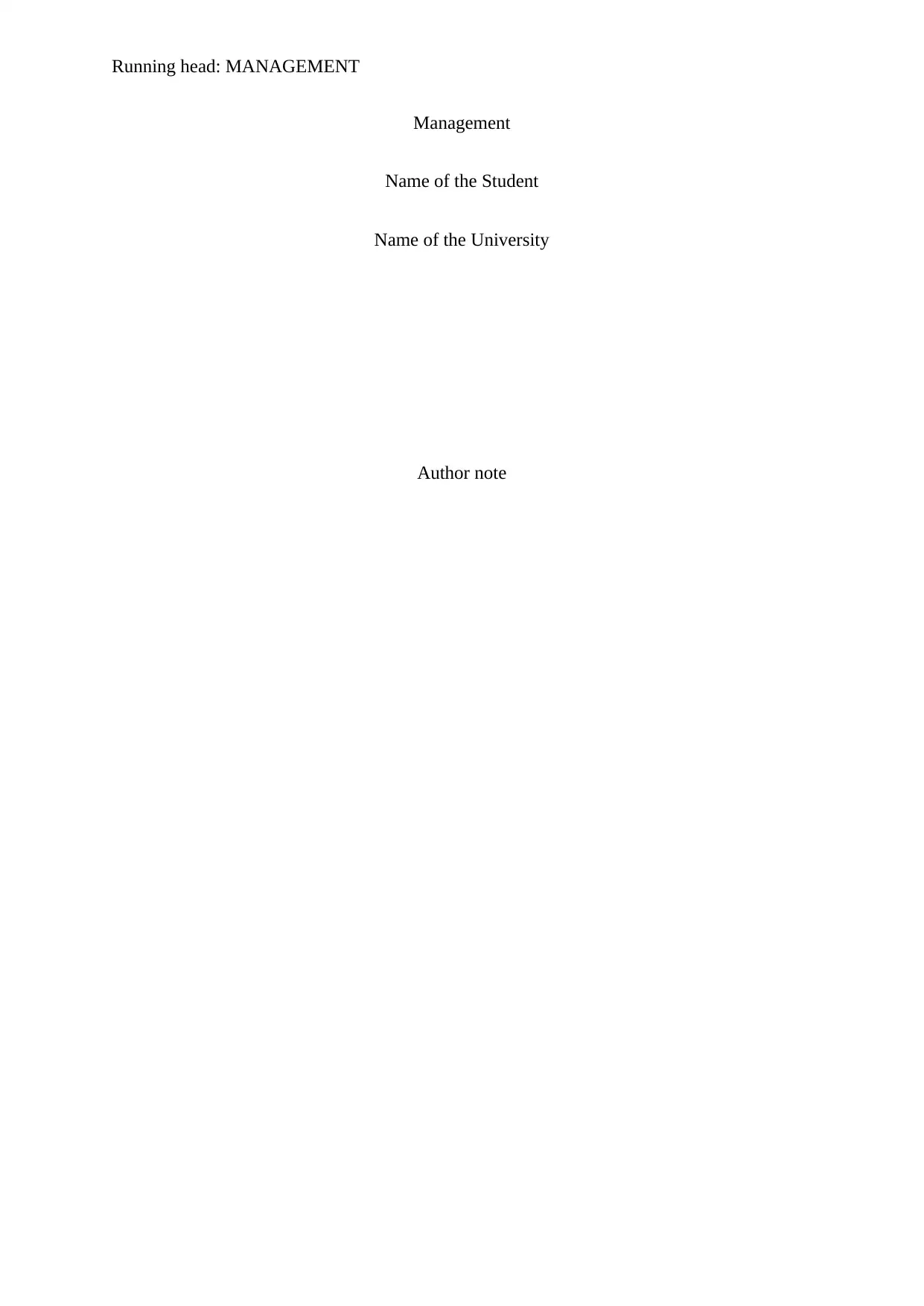
Running head: MANAGEMENT
Management
Name of the Student
Name of the University
Author note
Management
Name of the Student
Name of the University
Author note
Paraphrase This Document
Need a fresh take? Get an instant paraphrase of this document with our AI Paraphraser
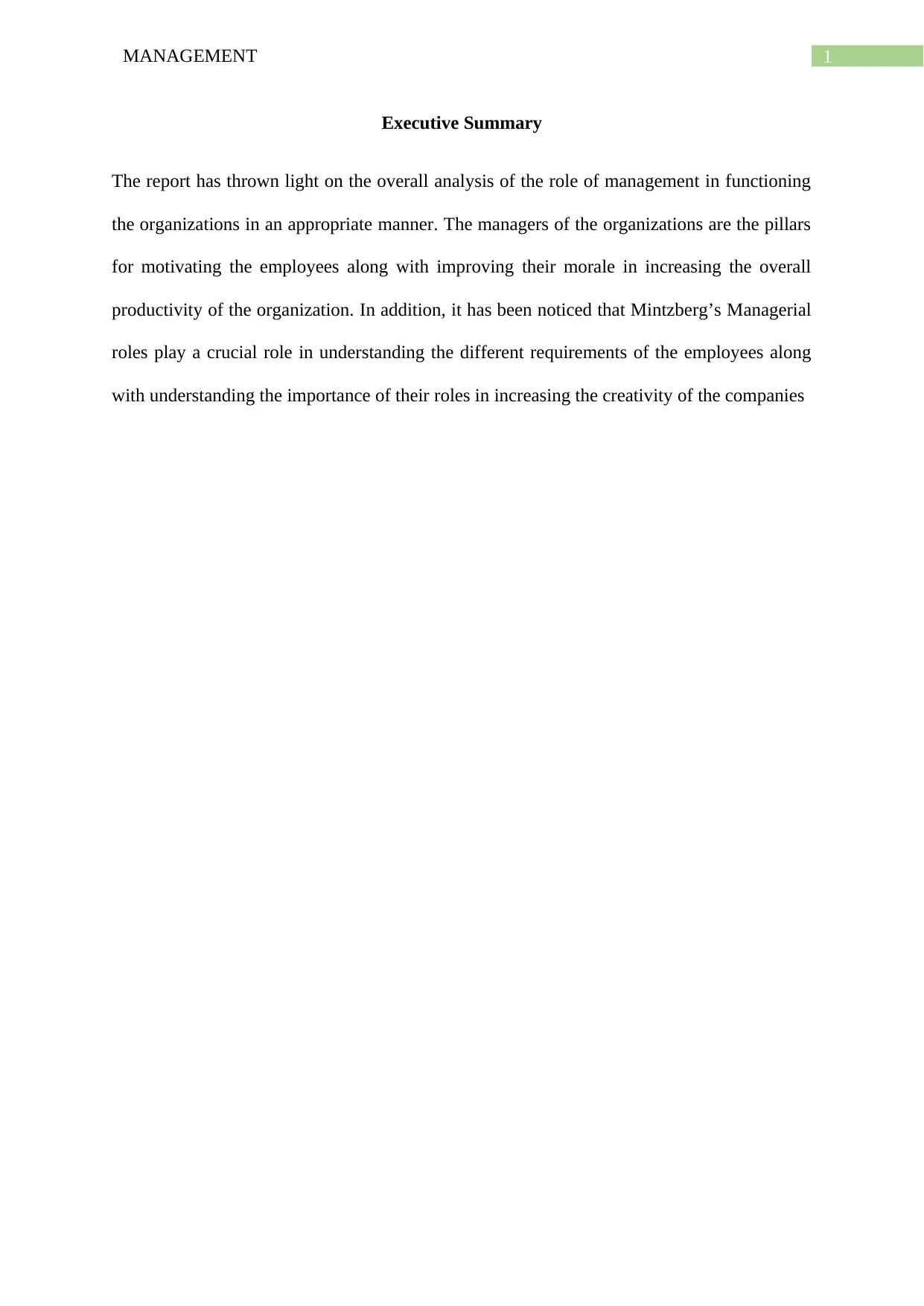
1MANAGEMENT
Executive Summary
The report has thrown light on the overall analysis of the role of management in functioning
the organizations in an appropriate manner. The managers of the organizations are the pillars
for motivating the employees along with improving their morale in increasing the overall
productivity of the organization. In addition, it has been noticed that Mintzberg’s Managerial
roles play a crucial role in understanding the different requirements of the employees along
with understanding the importance of their roles in increasing the creativity of the companies
Executive Summary
The report has thrown light on the overall analysis of the role of management in functioning
the organizations in an appropriate manner. The managers of the organizations are the pillars
for motivating the employees along with improving their morale in increasing the overall
productivity of the organization. In addition, it has been noticed that Mintzberg’s Managerial
roles play a crucial role in understanding the different requirements of the employees along
with understanding the importance of their roles in increasing the creativity of the companies
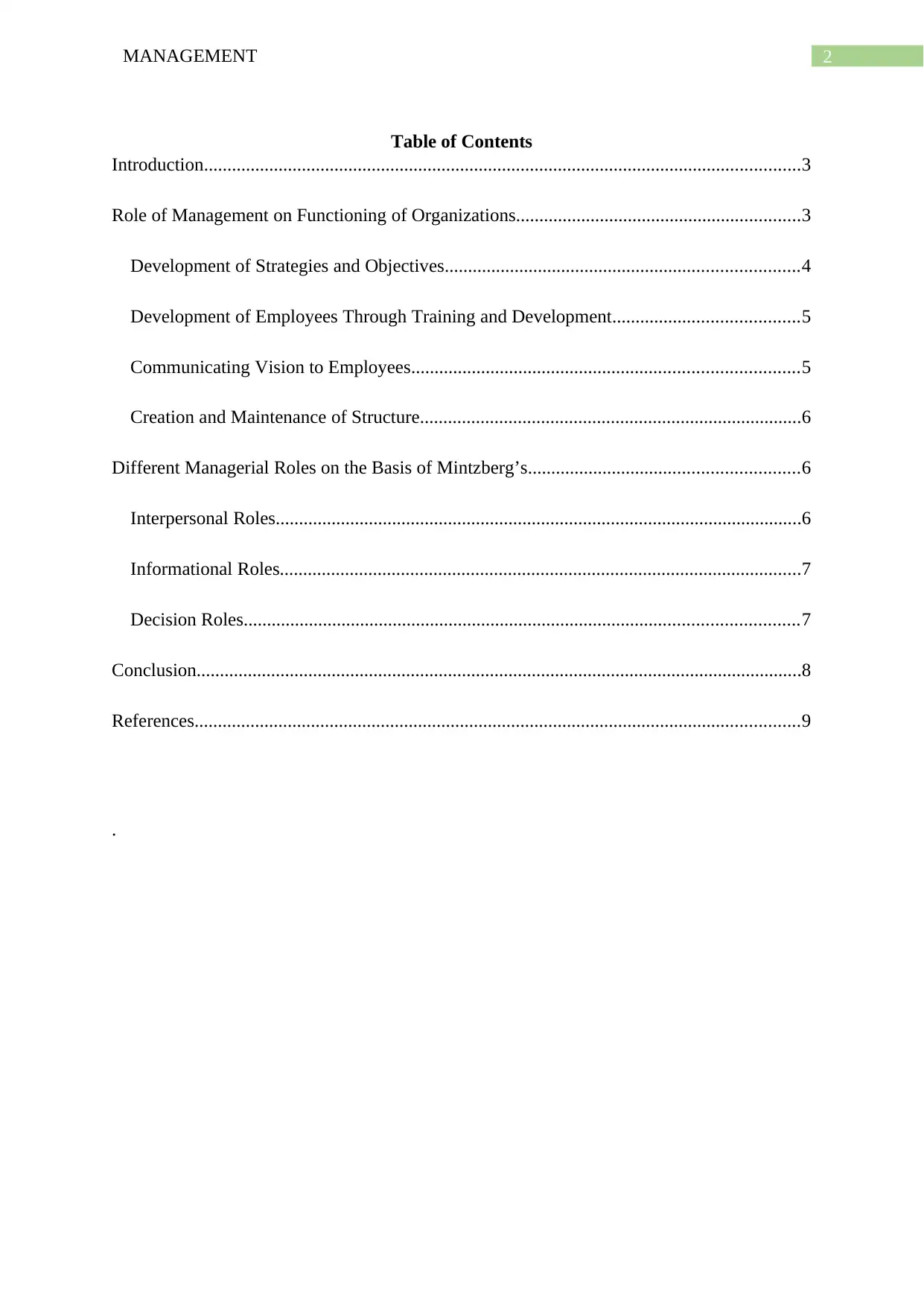
2MANAGEMENT
Table of Contents
Introduction................................................................................................................................3
Role of Management on Functioning of Organizations.............................................................3
Development of Strategies and Objectives............................................................................4
Development of Employees Through Training and Development........................................5
Communicating Vision to Employees...................................................................................5
Creation and Maintenance of Structure..................................................................................6
Different Managerial Roles on the Basis of Mintzberg’s..........................................................6
Interpersonal Roles.................................................................................................................6
Informational Roles................................................................................................................7
Decision Roles.......................................................................................................................7
Conclusion..................................................................................................................................8
References..................................................................................................................................9
.
Table of Contents
Introduction................................................................................................................................3
Role of Management on Functioning of Organizations.............................................................3
Development of Strategies and Objectives............................................................................4
Development of Employees Through Training and Development........................................5
Communicating Vision to Employees...................................................................................5
Creation and Maintenance of Structure..................................................................................6
Different Managerial Roles on the Basis of Mintzberg’s..........................................................6
Interpersonal Roles.................................................................................................................6
Informational Roles................................................................................................................7
Decision Roles.......................................................................................................................7
Conclusion..................................................................................................................................8
References..................................................................................................................................9
.
⊘ This is a preview!⊘
Do you want full access?
Subscribe today to unlock all pages.

Trusted by 1+ million students worldwide
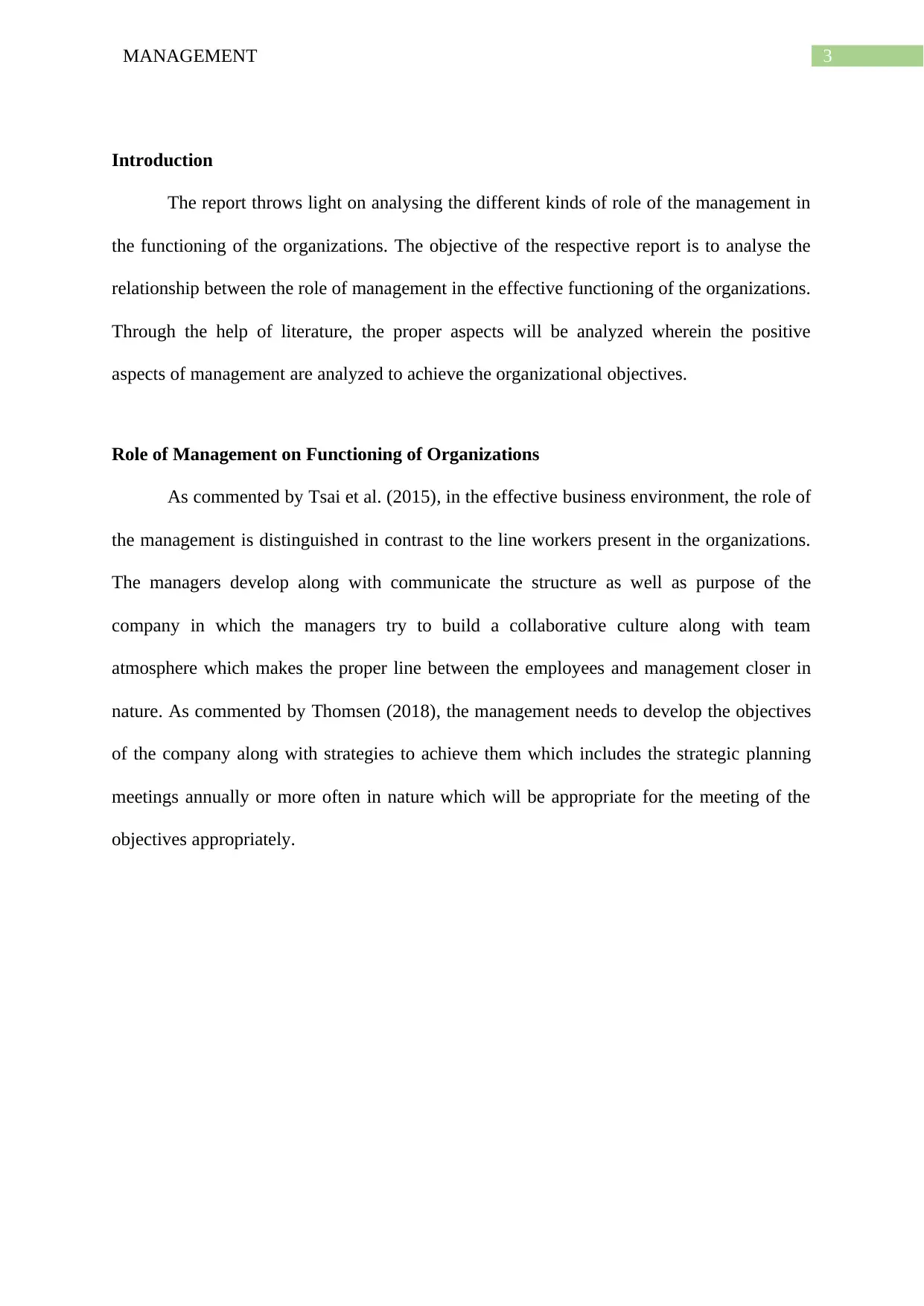
3MANAGEMENT
Introduction
The report throws light on analysing the different kinds of role of the management in
the functioning of the organizations. The objective of the respective report is to analyse the
relationship between the role of management in the effective functioning of the organizations.
Through the help of literature, the proper aspects will be analyzed wherein the positive
aspects of management are analyzed to achieve the organizational objectives.
Role of Management on Functioning of Organizations
As commented by Tsai et al. (2015), in the effective business environment, the role of
the management is distinguished in contrast to the line workers present in the organizations.
The managers develop along with communicate the structure as well as purpose of the
company in which the managers try to build a collaborative culture along with team
atmosphere which makes the proper line between the employees and management closer in
nature. As commented by Thomsen (2018), the management needs to develop the objectives
of the company along with strategies to achieve them which includes the strategic planning
meetings annually or more often in nature which will be appropriate for the meeting of the
objectives appropriately.
Introduction
The report throws light on analysing the different kinds of role of the management in
the functioning of the organizations. The objective of the respective report is to analyse the
relationship between the role of management in the effective functioning of the organizations.
Through the help of literature, the proper aspects will be analyzed wherein the positive
aspects of management are analyzed to achieve the organizational objectives.
Role of Management on Functioning of Organizations
As commented by Tsai et al. (2015), in the effective business environment, the role of
the management is distinguished in contrast to the line workers present in the organizations.
The managers develop along with communicate the structure as well as purpose of the
company in which the managers try to build a collaborative culture along with team
atmosphere which makes the proper line between the employees and management closer in
nature. As commented by Thomsen (2018), the management needs to develop the objectives
of the company along with strategies to achieve them which includes the strategic planning
meetings annually or more often in nature which will be appropriate for the meeting of the
objectives appropriately.
Paraphrase This Document
Need a fresh take? Get an instant paraphrase of this document with our AI Paraphraser
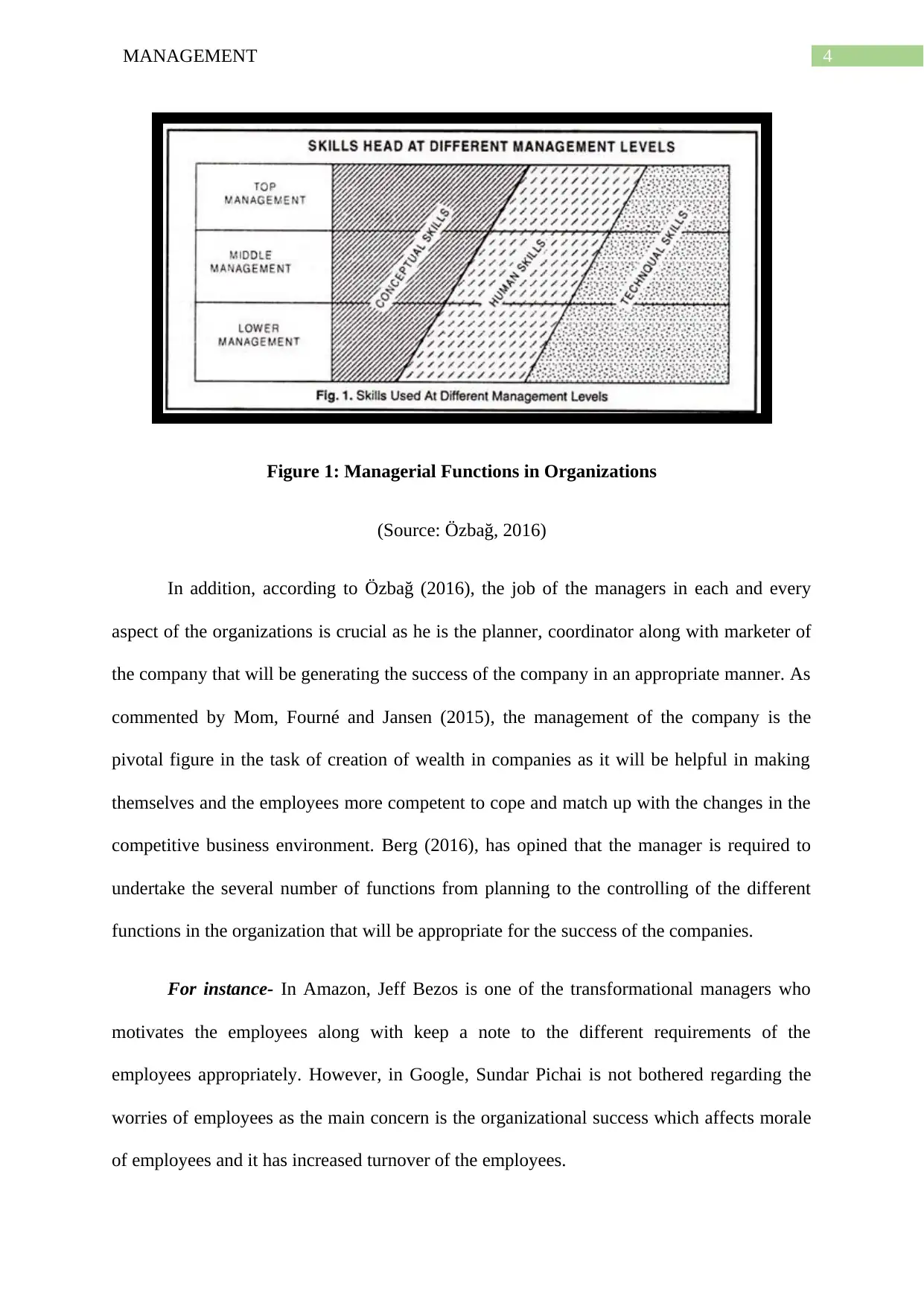
4MANAGEMENT
Figure 1: Managerial Functions in Organizations
(Source: Özbağ, 2016)
In addition, according to Özbağ (2016), the job of the managers in each and every
aspect of the organizations is crucial as he is the planner, coordinator along with marketer of
the company that will be generating the success of the company in an appropriate manner. As
commented by Mom, Fourné and Jansen (2015), the management of the company is the
pivotal figure in the task of creation of wealth in companies as it will be helpful in making
themselves and the employees more competent to cope and match up with the changes in the
competitive business environment. Berg (2016), has opined that the manager is required to
undertake the several number of functions from planning to the controlling of the different
functions in the organization that will be appropriate for the success of the companies.
For instance- In Amazon, Jeff Bezos is one of the transformational managers who
motivates the employees along with keep a note to the different requirements of the
employees appropriately. However, in Google, Sundar Pichai is not bothered regarding the
worries of employees as the main concern is the organizational success which affects morale
of employees and it has increased turnover of the employees.
Figure 1: Managerial Functions in Organizations
(Source: Özbağ, 2016)
In addition, according to Özbağ (2016), the job of the managers in each and every
aspect of the organizations is crucial as he is the planner, coordinator along with marketer of
the company that will be generating the success of the company in an appropriate manner. As
commented by Mom, Fourné and Jansen (2015), the management of the company is the
pivotal figure in the task of creation of wealth in companies as it will be helpful in making
themselves and the employees more competent to cope and match up with the changes in the
competitive business environment. Berg (2016), has opined that the manager is required to
undertake the several number of functions from planning to the controlling of the different
functions in the organization that will be appropriate for the success of the companies.
For instance- In Amazon, Jeff Bezos is one of the transformational managers who
motivates the employees along with keep a note to the different requirements of the
employees appropriately. However, in Google, Sundar Pichai is not bothered regarding the
worries of employees as the main concern is the organizational success which affects morale
of employees and it has increased turnover of the employees.
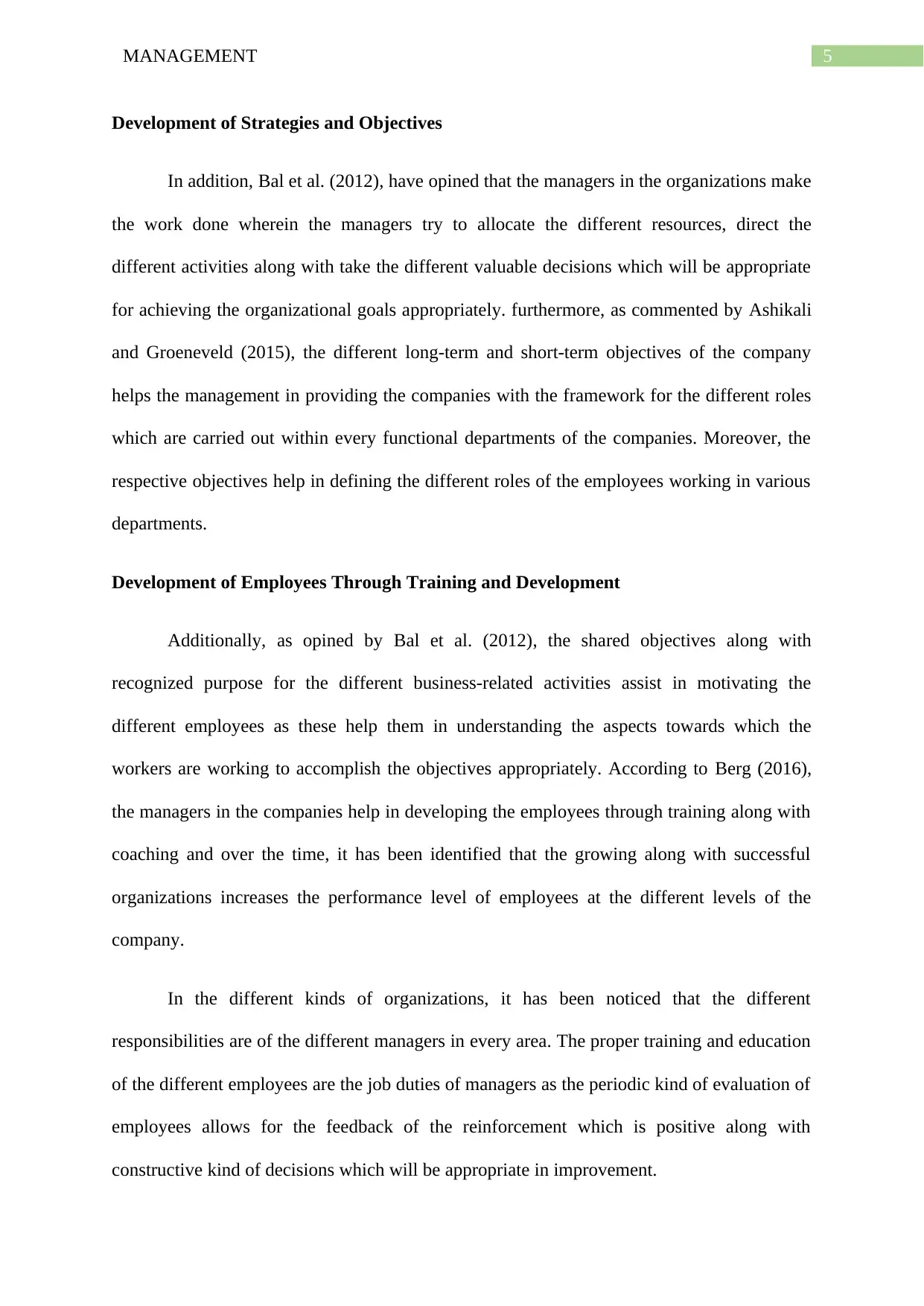
5MANAGEMENT
Development of Strategies and Objectives
In addition, Bal et al. (2012), have opined that the managers in the organizations make
the work done wherein the managers try to allocate the different resources, direct the
different activities along with take the different valuable decisions which will be appropriate
for achieving the organizational goals appropriately. furthermore, as commented by Ashikali
and Groeneveld (2015), the different long-term and short-term objectives of the company
helps the management in providing the companies with the framework for the different roles
which are carried out within every functional departments of the companies. Moreover, the
respective objectives help in defining the different roles of the employees working in various
departments.
Development of Employees Through Training and Development
Additionally, as opined by Bal et al. (2012), the shared objectives along with
recognized purpose for the different business-related activities assist in motivating the
different employees as these help them in understanding the aspects towards which the
workers are working to accomplish the objectives appropriately. According to Berg (2016),
the managers in the companies help in developing the employees through training along with
coaching and over the time, it has been identified that the growing along with successful
organizations increases the performance level of employees at the different levels of the
company.
In the different kinds of organizations, it has been noticed that the different
responsibilities are of the different managers in every area. The proper training and education
of the different employees are the job duties of managers as the periodic kind of evaluation of
employees allows for the feedback of the reinforcement which is positive along with
constructive kind of decisions which will be appropriate in improvement.
Development of Strategies and Objectives
In addition, Bal et al. (2012), have opined that the managers in the organizations make
the work done wherein the managers try to allocate the different resources, direct the
different activities along with take the different valuable decisions which will be appropriate
for achieving the organizational goals appropriately. furthermore, as commented by Ashikali
and Groeneveld (2015), the different long-term and short-term objectives of the company
helps the management in providing the companies with the framework for the different roles
which are carried out within every functional departments of the companies. Moreover, the
respective objectives help in defining the different roles of the employees working in various
departments.
Development of Employees Through Training and Development
Additionally, as opined by Bal et al. (2012), the shared objectives along with
recognized purpose for the different business-related activities assist in motivating the
different employees as these help them in understanding the aspects towards which the
workers are working to accomplish the objectives appropriately. According to Berg (2016),
the managers in the companies help in developing the employees through training along with
coaching and over the time, it has been identified that the growing along with successful
organizations increases the performance level of employees at the different levels of the
company.
In the different kinds of organizations, it has been noticed that the different
responsibilities are of the different managers in every area. The proper training and education
of the different employees are the job duties of managers as the periodic kind of evaluation of
employees allows for the feedback of the reinforcement which is positive along with
constructive kind of decisions which will be appropriate in improvement.
⊘ This is a preview!⊘
Do you want full access?
Subscribe today to unlock all pages.

Trusted by 1+ million students worldwide
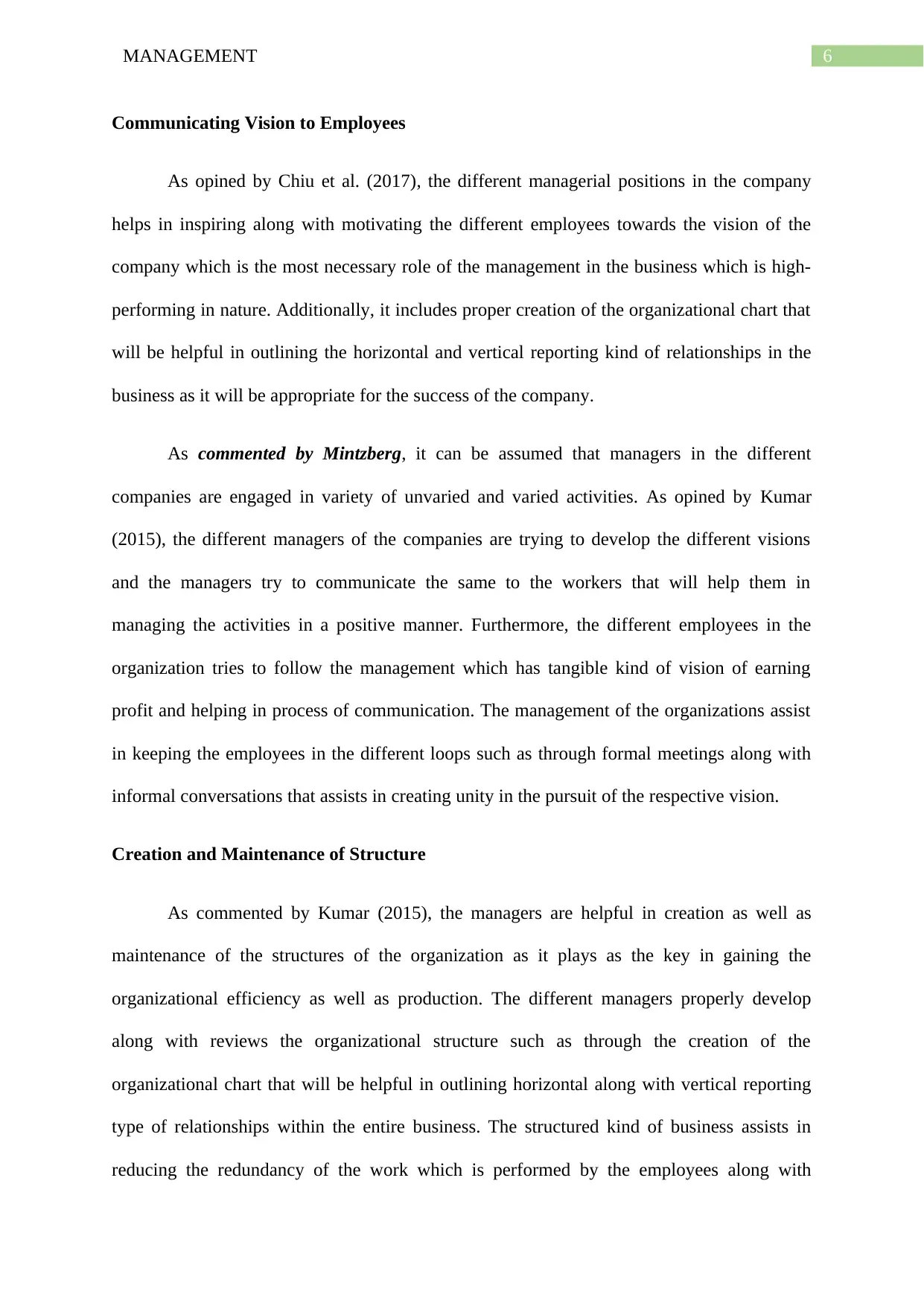
6MANAGEMENT
Communicating Vision to Employees
As opined by Chiu et al. (2017), the different managerial positions in the company
helps in inspiring along with motivating the different employees towards the vision of the
company which is the most necessary role of the management in the business which is high-
performing in nature. Additionally, it includes proper creation of the organizational chart that
will be helpful in outlining the horizontal and vertical reporting kind of relationships in the
business as it will be appropriate for the success of the company.
As commented by Mintzberg, it can be assumed that managers in the different
companies are engaged in variety of unvaried and varied activities. As opined by Kumar
(2015), the different managers of the companies are trying to develop the different visions
and the managers try to communicate the same to the workers that will help them in
managing the activities in a positive manner. Furthermore, the different employees in the
organization tries to follow the management which has tangible kind of vision of earning
profit and helping in process of communication. The management of the organizations assist
in keeping the employees in the different loops such as through formal meetings along with
informal conversations that assists in creating unity in the pursuit of the respective vision.
Creation and Maintenance of Structure
As commented by Kumar (2015), the managers are helpful in creation as well as
maintenance of the structures of the organization as it plays as the key in gaining the
organizational efficiency as well as production. The different managers properly develop
along with reviews the organizational structure such as through the creation of the
organizational chart that will be helpful in outlining horizontal along with vertical reporting
type of relationships within the entire business. The structured kind of business assists in
reducing the redundancy of the work which is performed by the employees along with
Communicating Vision to Employees
As opined by Chiu et al. (2017), the different managerial positions in the company
helps in inspiring along with motivating the different employees towards the vision of the
company which is the most necessary role of the management in the business which is high-
performing in nature. Additionally, it includes proper creation of the organizational chart that
will be helpful in outlining the horizontal and vertical reporting kind of relationships in the
business as it will be appropriate for the success of the company.
As commented by Mintzberg, it can be assumed that managers in the different
companies are engaged in variety of unvaried and varied activities. As opined by Kumar
(2015), the different managers of the companies are trying to develop the different visions
and the managers try to communicate the same to the workers that will help them in
managing the activities in a positive manner. Furthermore, the different employees in the
organization tries to follow the management which has tangible kind of vision of earning
profit and helping in process of communication. The management of the organizations assist
in keeping the employees in the different loops such as through formal meetings along with
informal conversations that assists in creating unity in the pursuit of the respective vision.
Creation and Maintenance of Structure
As commented by Kumar (2015), the managers are helpful in creation as well as
maintenance of the structures of the organization as it plays as the key in gaining the
organizational efficiency as well as production. The different managers properly develop
along with reviews the organizational structure such as through the creation of the
organizational chart that will be helpful in outlining horizontal along with vertical reporting
type of relationships within the entire business. The structured kind of business assists in
reducing the redundancy of the work which is performed by the employees along with
Paraphrase This Document
Need a fresh take? Get an instant paraphrase of this document with our AI Paraphraser
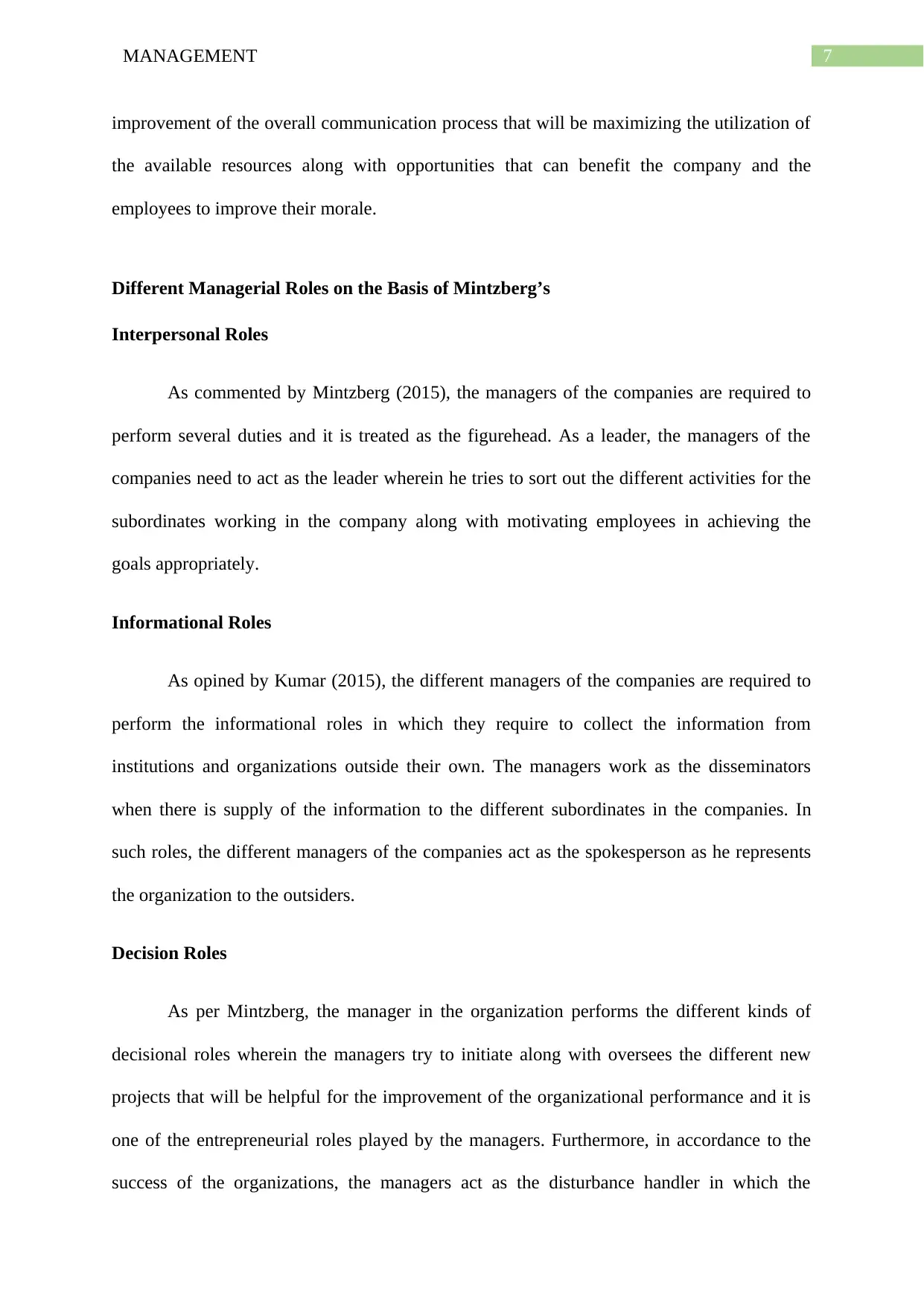
7MANAGEMENT
improvement of the overall communication process that will be maximizing the utilization of
the available resources along with opportunities that can benefit the company and the
employees to improve their morale.
Different Managerial Roles on the Basis of Mintzberg’s
Interpersonal Roles
As commented by Mintzberg (2015), the managers of the companies are required to
perform several duties and it is treated as the figurehead. As a leader, the managers of the
companies need to act as the leader wherein he tries to sort out the different activities for the
subordinates working in the company along with motivating employees in achieving the
goals appropriately.
Informational Roles
As opined by Kumar (2015), the different managers of the companies are required to
perform the informational roles in which they require to collect the information from
institutions and organizations outside their own. The managers work as the disseminators
when there is supply of the information to the different subordinates in the companies. In
such roles, the different managers of the companies act as the spokesperson as he represents
the organization to the outsiders.
Decision Roles
As per Mintzberg, the manager in the organization performs the different kinds of
decisional roles wherein the managers try to initiate along with oversees the different new
projects that will be helpful for the improvement of the organizational performance and it is
one of the entrepreneurial roles played by the managers. Furthermore, in accordance to the
success of the organizations, the managers act as the disturbance handler in which the
improvement of the overall communication process that will be maximizing the utilization of
the available resources along with opportunities that can benefit the company and the
employees to improve their morale.
Different Managerial Roles on the Basis of Mintzberg’s
Interpersonal Roles
As commented by Mintzberg (2015), the managers of the companies are required to
perform several duties and it is treated as the figurehead. As a leader, the managers of the
companies need to act as the leader wherein he tries to sort out the different activities for the
subordinates working in the company along with motivating employees in achieving the
goals appropriately.
Informational Roles
As opined by Kumar (2015), the different managers of the companies are required to
perform the informational roles in which they require to collect the information from
institutions and organizations outside their own. The managers work as the disseminators
when there is supply of the information to the different subordinates in the companies. In
such roles, the different managers of the companies act as the spokesperson as he represents
the organization to the outsiders.
Decision Roles
As per Mintzberg, the manager in the organization performs the different kinds of
decisional roles wherein the managers try to initiate along with oversees the different new
projects that will be helpful for the improvement of the organizational performance and it is
one of the entrepreneurial roles played by the managers. Furthermore, in accordance to the
success of the organizations, the managers act as the disturbance handler in which the
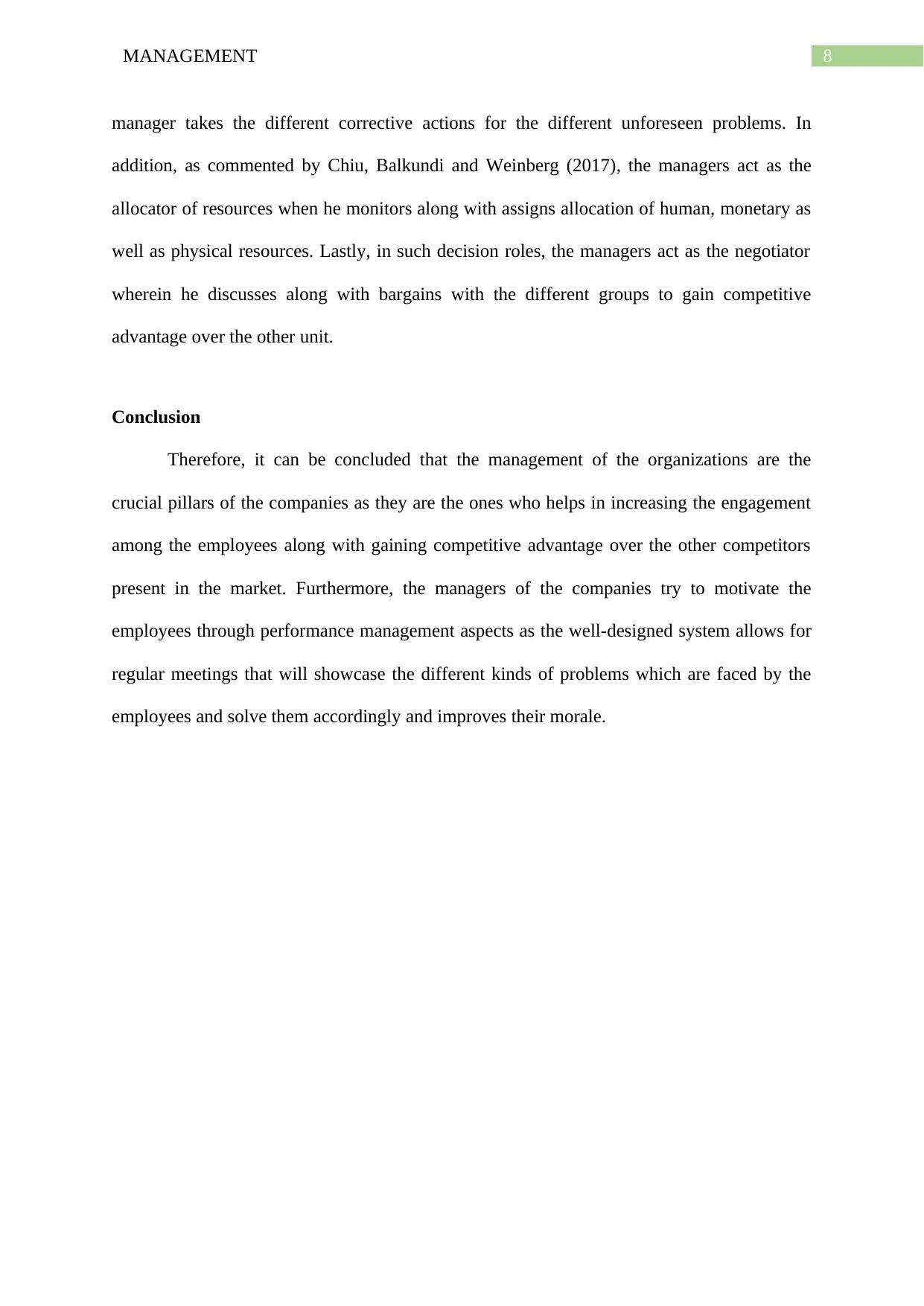
8MANAGEMENT
manager takes the different corrective actions for the different unforeseen problems. In
addition, as commented by Chiu, Balkundi and Weinberg (2017), the managers act as the
allocator of resources when he monitors along with assigns allocation of human, monetary as
well as physical resources. Lastly, in such decision roles, the managers act as the negotiator
wherein he discusses along with bargains with the different groups to gain competitive
advantage over the other unit.
Conclusion
Therefore, it can be concluded that the management of the organizations are the
crucial pillars of the companies as they are the ones who helps in increasing the engagement
among the employees along with gaining competitive advantage over the other competitors
present in the market. Furthermore, the managers of the companies try to motivate the
employees through performance management aspects as the well-designed system allows for
regular meetings that will showcase the different kinds of problems which are faced by the
employees and solve them accordingly and improves their morale.
manager takes the different corrective actions for the different unforeseen problems. In
addition, as commented by Chiu, Balkundi and Weinberg (2017), the managers act as the
allocator of resources when he monitors along with assigns allocation of human, monetary as
well as physical resources. Lastly, in such decision roles, the managers act as the negotiator
wherein he discusses along with bargains with the different groups to gain competitive
advantage over the other unit.
Conclusion
Therefore, it can be concluded that the management of the organizations are the
crucial pillars of the companies as they are the ones who helps in increasing the engagement
among the employees along with gaining competitive advantage over the other competitors
present in the market. Furthermore, the managers of the companies try to motivate the
employees through performance management aspects as the well-designed system allows for
regular meetings that will showcase the different kinds of problems which are faced by the
employees and solve them accordingly and improves their morale.
⊘ This is a preview!⊘
Do you want full access?
Subscribe today to unlock all pages.

Trusted by 1+ million students worldwide
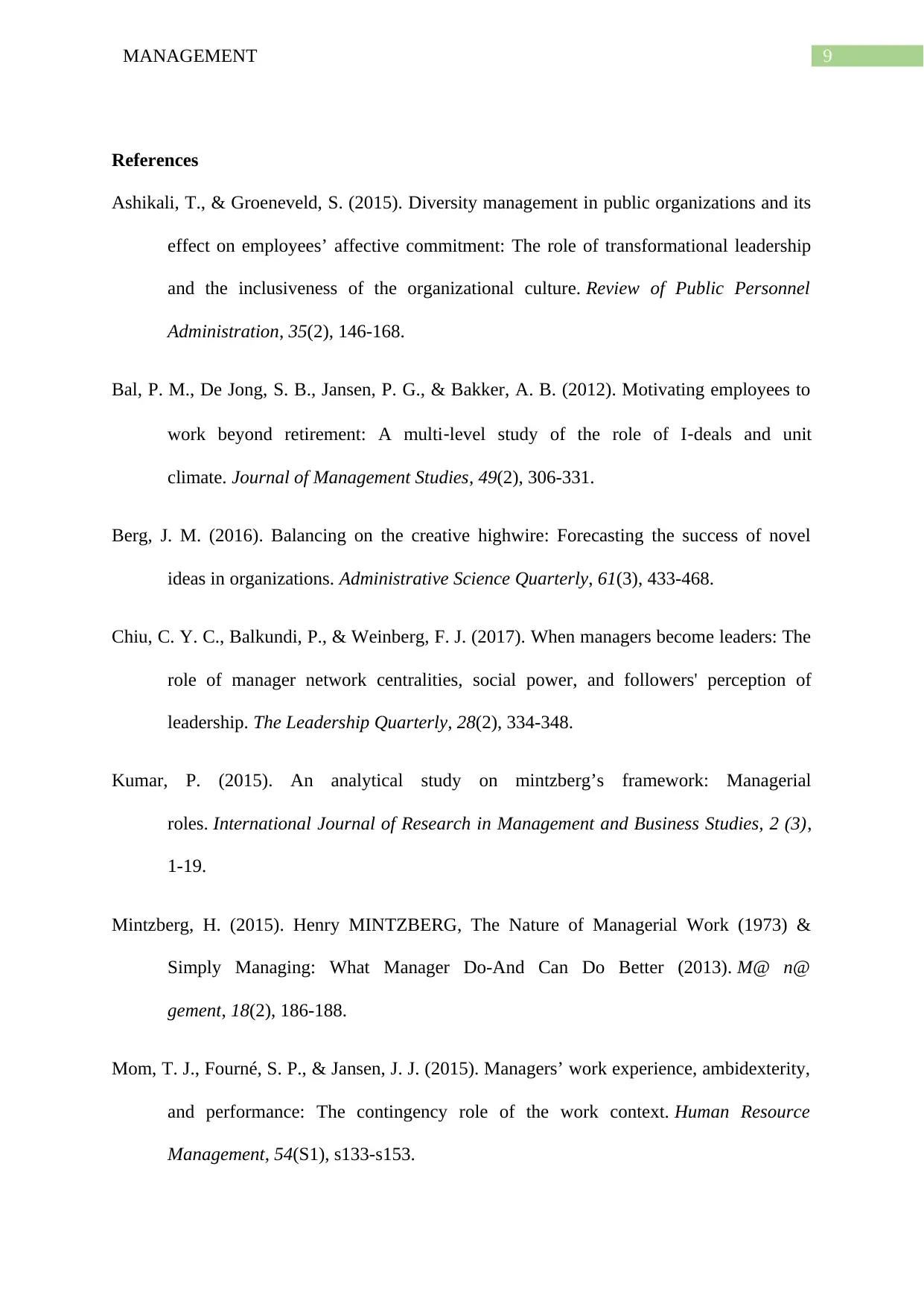
9MANAGEMENT
References
Ashikali, T., & Groeneveld, S. (2015). Diversity management in public organizations and its
effect on employees’ affective commitment: The role of transformational leadership
and the inclusiveness of the organizational culture. Review of Public Personnel
Administration, 35(2), 146-168.
Bal, P. M., De Jong, S. B., Jansen, P. G., & Bakker, A. B. (2012). Motivating employees to
work beyond retirement: A multi‐level study of the role of I‐deals and unit
climate. Journal of Management Studies, 49(2), 306-331.
Berg, J. M. (2016). Balancing on the creative highwire: Forecasting the success of novel
ideas in organizations. Administrative Science Quarterly, 61(3), 433-468.
Chiu, C. Y. C., Balkundi, P., & Weinberg, F. J. (2017). When managers become leaders: The
role of manager network centralities, social power, and followers' perception of
leadership. The Leadership Quarterly, 28(2), 334-348.
Kumar, P. (2015). An analytical study on mintzberg’s framework: Managerial
roles. International Journal of Research in Management and Business Studies, 2 (3),
1-19.
Mintzberg, H. (2015). Henry MINTZBERG, The Nature of Managerial Work (1973) &
Simply Managing: What Manager Do-And Can Do Better (2013). M@ n@
gement, 18(2), 186-188.
Mom, T. J., Fourné, S. P., & Jansen, J. J. (2015). Managers’ work experience, ambidexterity,
and performance: The contingency role of the work context. Human Resource
Management, 54(S1), s133-s153.
References
Ashikali, T., & Groeneveld, S. (2015). Diversity management in public organizations and its
effect on employees’ affective commitment: The role of transformational leadership
and the inclusiveness of the organizational culture. Review of Public Personnel
Administration, 35(2), 146-168.
Bal, P. M., De Jong, S. B., Jansen, P. G., & Bakker, A. B. (2012). Motivating employees to
work beyond retirement: A multi‐level study of the role of I‐deals and unit
climate. Journal of Management Studies, 49(2), 306-331.
Berg, J. M. (2016). Balancing on the creative highwire: Forecasting the success of novel
ideas in organizations. Administrative Science Quarterly, 61(3), 433-468.
Chiu, C. Y. C., Balkundi, P., & Weinberg, F. J. (2017). When managers become leaders: The
role of manager network centralities, social power, and followers' perception of
leadership. The Leadership Quarterly, 28(2), 334-348.
Kumar, P. (2015). An analytical study on mintzberg’s framework: Managerial
roles. International Journal of Research in Management and Business Studies, 2 (3),
1-19.
Mintzberg, H. (2015). Henry MINTZBERG, The Nature of Managerial Work (1973) &
Simply Managing: What Manager Do-And Can Do Better (2013). M@ n@
gement, 18(2), 186-188.
Mom, T. J., Fourné, S. P., & Jansen, J. J. (2015). Managers’ work experience, ambidexterity,
and performance: The contingency role of the work context. Human Resource
Management, 54(S1), s133-s153.
Paraphrase This Document
Need a fresh take? Get an instant paraphrase of this document with our AI Paraphraser
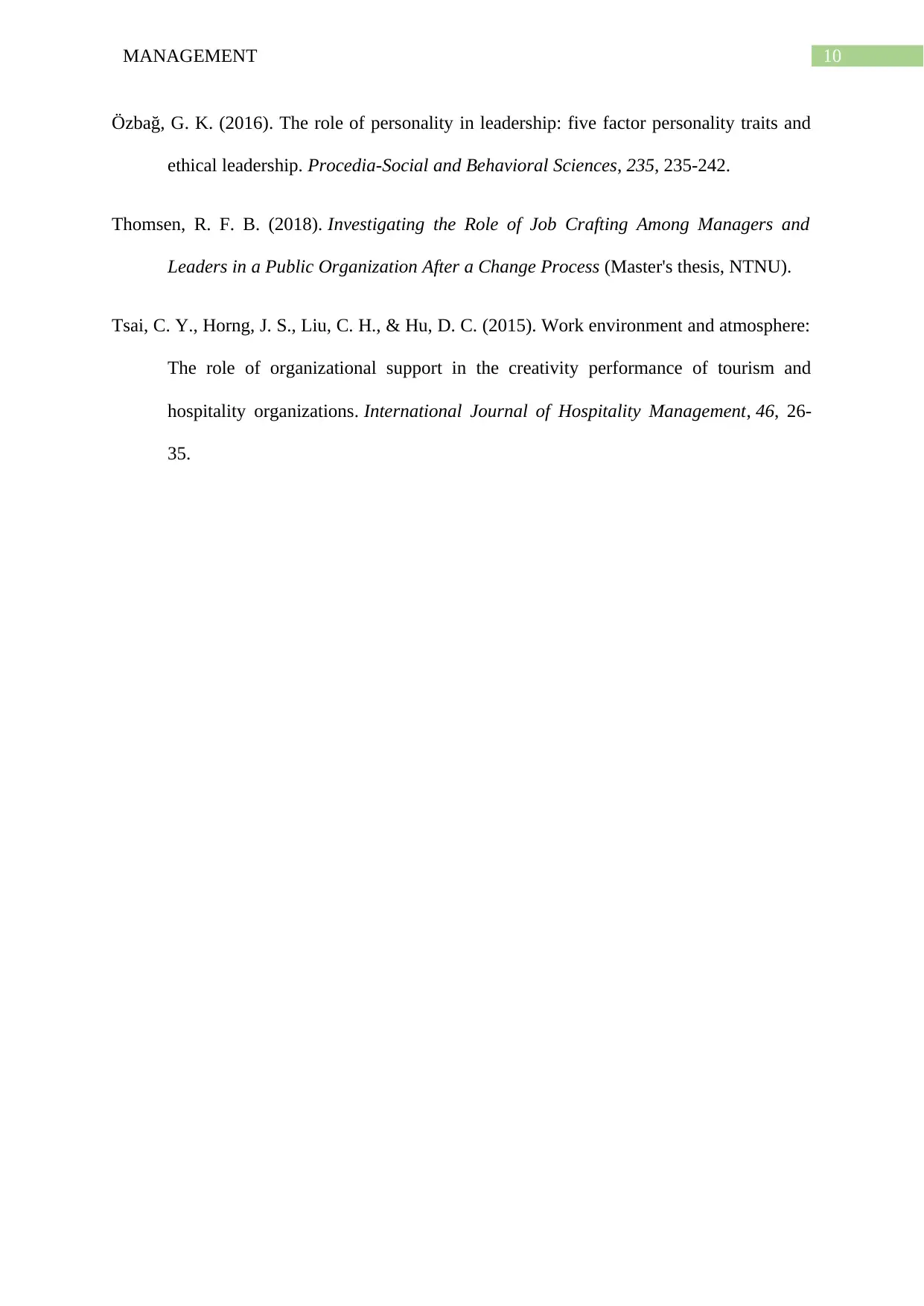
10MANAGEMENT
Özbağ, G. K. (2016). The role of personality in leadership: five factor personality traits and
ethical leadership. Procedia-Social and Behavioral Sciences, 235, 235-242.
Thomsen, R. F. B. (2018). Investigating the Role of Job Crafting Among Managers and
Leaders in a Public Organization After a Change Process (Master's thesis, NTNU).
Tsai, C. Y., Horng, J. S., Liu, C. H., & Hu, D. C. (2015). Work environment and atmosphere:
The role of organizational support in the creativity performance of tourism and
hospitality organizations. International Journal of Hospitality Management, 46, 26-
35.
Özbağ, G. K. (2016). The role of personality in leadership: five factor personality traits and
ethical leadership. Procedia-Social and Behavioral Sciences, 235, 235-242.
Thomsen, R. F. B. (2018). Investigating the Role of Job Crafting Among Managers and
Leaders in a Public Organization After a Change Process (Master's thesis, NTNU).
Tsai, C. Y., Horng, J. S., Liu, C. H., & Hu, D. C. (2015). Work environment and atmosphere:
The role of organizational support in the creativity performance of tourism and
hospitality organizations. International Journal of Hospitality Management, 46, 26-
35.
1 out of 11
Related Documents
Your All-in-One AI-Powered Toolkit for Academic Success.
+13062052269
info@desklib.com
Available 24*7 on WhatsApp / Email
![[object Object]](/_next/static/media/star-bottom.7253800d.svg)
Unlock your academic potential
Copyright © 2020–2026 A2Z Services. All Rights Reserved. Developed and managed by ZUCOL.





